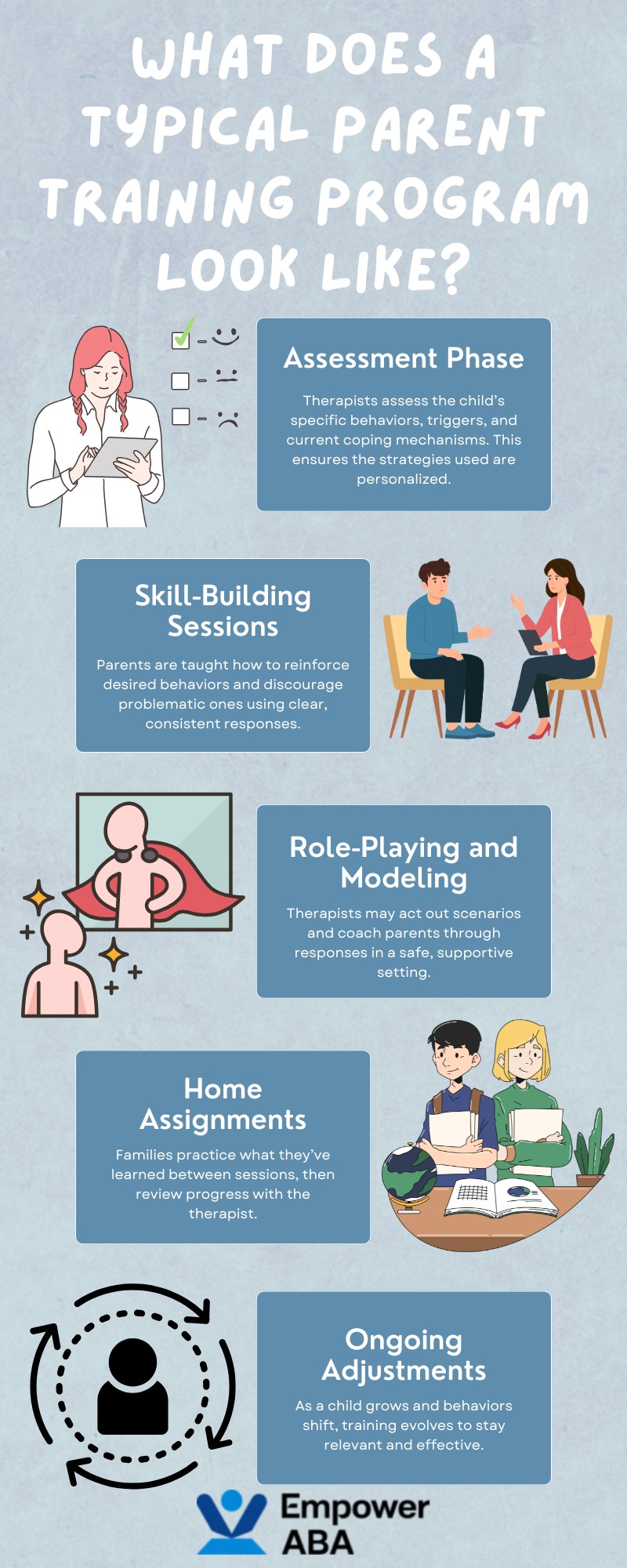Key Points:
- Parent training for disruptive behavior is one of the most effective long-term strategies to support children at home and in school.
- Applied Behavior Analysis (ABA)-based methods equip parents with tools to manage and reduce problematic behaviors.
- Personalized training and consistency are key in seeing meaningful change in a child’s behavior.
Does it feel like no matter what you do, your child’s behavior keeps escalating? You’re not failing—they’re struggling, and there’s help. Parent training for disruptive behavior can give you the skills and structure you need to support any child with a developmental disorder in a way that’s effective, kind, and lasting.
What Is Parent Training for Disruptive Behavior?
If you’ve ever felt helpless or exhausted trying to manage your child’s tantrums, aggression, or defiance, you’re not alone—and you’re not without options. Parent training for disruptive behavior involves structured guidance that teaches caregivers how to encourage positive behaviors and respond appropriately to problem behaviors.
This type of training is often used alongside Applied Behavior Analysis (ABA) therapy. Rather than relying on punishment or guesswork, it arms parents with scientifically backed strategies. These are customized based on each child’s unique needs and typically involve active participation, coaching, and home-based assignments to practice skills in real life.

Parent training, however, is not a one-size-fits-all approach. It adapts to each family’s routines, values, and specific challenges.
Which Strategies Work Best for Disruptive Behavior?
The most effective strategies are those that combine consistency, structure, and positive reinforcement. Instead of focusing on stopping bad behavior, ABA-based parent training puts emphasis on teaching alternative, appropriate behaviors.
Below are some often-used evidence-based strategies:
- Positive Reinforcement: Rewarding behaviors you want to see more often, such as using words instead of hitting.
- Planned Ignoring: Intentionally ignoring minor attention-seeking behaviors to avoid reinforcing them.
- Visual Schedules: Helping children anticipate transitions and stay on task with visual prompts.
- First-Then Statements: Providing clear expectations, like “First clean up toys, then we’ll play outside.”
- Time-In (Not Time-Out): Staying close during emotional outbursts to co-regulate instead of isolating.
These tools help build a language of expectations and consequences that kids can understand, reducing frustration on both ends. Every strategy should also be applied consistently and tracked over time to see what’s working and what needs tweaking. Keep in mind that not all behaviors change overnight—small wins build toward long-term success.
What Should Parents Avoid When Managing Disruptive Behavior?
It’s just as important to know what not to do. Many well-intentioned parenting habits can unintentionally reinforce disruptive behavior. This usually happens when the behavior “works” for the child—if screaming gets them out of brushing their teeth, they’ll keep doing it.
Here are some common pitfalls to avoid:
- Inconsistent Consequences: Following through every time builds trust and understanding.
- Yelling or Physical Punishment: These reactions may escalate the behavior or create fear, not learning.
- Over-Explaining During a Tantrum: Kids in meltdown mode can’t process logic—save the teaching moment for after.
- Giving In: While giving the child what they want may stop the behavior short-term, it reinforces the disruption long-term.
- Delaying Intervention: Addressing behaviors early prevents them from becoming entrenched habits.
Avoiding these habits creates a more stable, predictable environment—which is exactly what kids with disruptive behaviors need. By understanding common pitfalls, parents can avoid reinforcing negative patterns and start shifting the behavior landscape
When Should You Consider Parent Training?
If you find yourself dreading daily routines, negotiating every request, or feeling like nothing works no matter how hard you try, it might be time to seek support. Parent training isn’t a last resort—it’s often the best first step.
Disruptive behavior disorders such as ADHD, ODD (Oppositional Defiant Disorder), and autism-related behavioral challenges respond particularly well to ABA-guided parent training. However, even kids without a formal diagnosis can benefit.
How Long Does It Take to See Results?
One of the most common questions parents ask is, “How long until this works?” While the answer depends on the child and the consistency of application, most families begin seeing measurable improvements within a few weeks.
The key to long-term success lies in repetition, patience, and the willingness to adjust techniques based on what the data shows. You’re not looking for a quick fix—you’re building a foundation for better communication, emotional regulation, and mutual respect.
Is ABA Therapy Necessary Alongside Parent Training?
ABA therapy and parent training are deeply interconnected. While parent training teaches you the “what” and “how” of behavior management, ABA therapy helps your child build the skills they need to succeed. Together, they create a holistic approach that targets behavior from all angles.
When both parts work in tandem, children are more likely to generalize skills across environments—home, school, therapy settings—and show lasting changes.
This dual approach is especially effective for:
- Children with autism
- Kids with developmental delays
- Persistent behavioral challenges that haven’t responded to other methods
If your child is receiving ABA therapy, ask your provider about integrating parent training sessions into your care plan.
Take the Next Step Toward Change with Empower ABA
Disruptive behavior doesn’t have to define your days—or your relationship with your child. With the right tools and support, meaningful change is not only possible, it’s within reach. Empower ABA specializes in providing tailored ABA therapy services in Virginia, New Jersey, or New York that include parent training for disruptive behavior.
Ready to reclaim calm, consistency, and connection? Our compassionate and experienced team is ready to walk with you every step of the way. Get in touch with us today and get started with personalized ABA therapy at Empower ABA!

